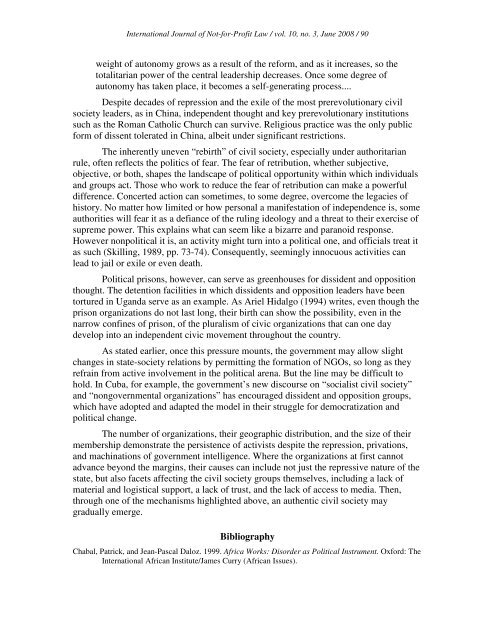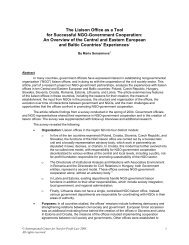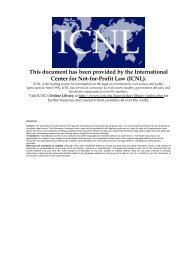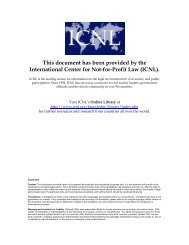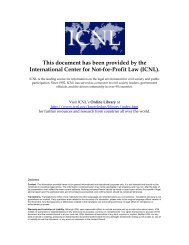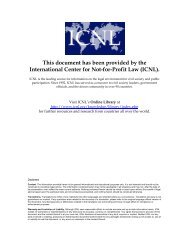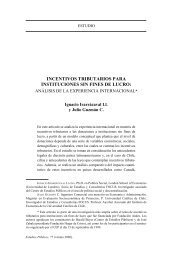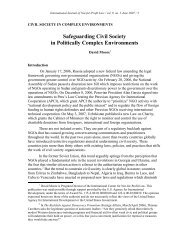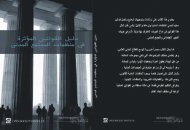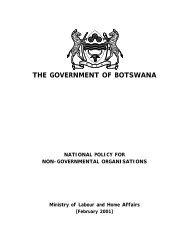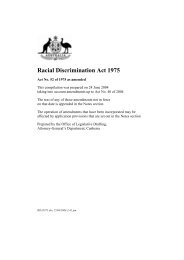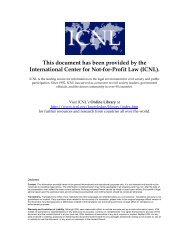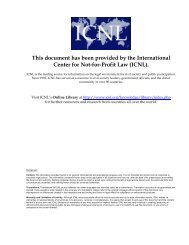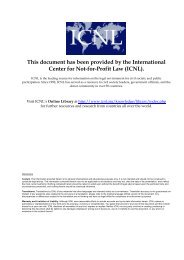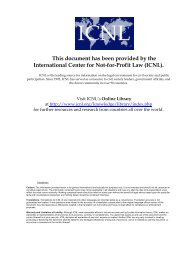Rising from the Ashes: The Rebirth of Civil Society in an ...
Rising from the Ashes: The Rebirth of Civil Society in an ...
Rising from the Ashes: The Rebirth of Civil Society in an ...
Create successful ePaper yourself
Turn your PDF publications into a flip-book with our unique Google optimized e-Paper software.
International Journal <strong>of</strong> Not-for-Pr<strong>of</strong>it Law / vol. 10, no. 3, June 2008 / 90<br />
weight <strong>of</strong> autonomy grows as a result <strong>of</strong> <strong>the</strong> reform, <strong>an</strong>d as it <strong>in</strong>creases, so <strong>the</strong><br />
totalitari<strong>an</strong> power <strong>of</strong> <strong>the</strong> central leadership decreases. Once some degree <strong>of</strong><br />
autonomy has taken place, it becomes a self-generat<strong>in</strong>g process....<br />
Despite decades <strong>of</strong> repression <strong>an</strong>d <strong>the</strong> exile <strong>of</strong> <strong>the</strong> most prerevolutionary civil<br />
society leaders, as <strong>in</strong> Ch<strong>in</strong>a, <strong>in</strong>dependent thought <strong>an</strong>d key prerevolutionary <strong>in</strong>stitutions<br />
such as <strong>the</strong> Rom<strong>an</strong> Catholic Church c<strong>an</strong> survive. Religious practice was <strong>the</strong> only public<br />
form <strong>of</strong> dissent tolerated <strong>in</strong> Ch<strong>in</strong>a, albeit under signific<strong>an</strong>t restrictions.<br />
<strong>The</strong> <strong>in</strong>herently uneven “rebirth” <strong>of</strong> civil society, especially under authoritari<strong>an</strong><br />
rule, <strong>of</strong>ten reflects <strong>the</strong> politics <strong>of</strong> fear. <strong>The</strong> fear <strong>of</strong> retribution, whe<strong>the</strong>r subjective,<br />
objective, or both, shapes <strong>the</strong> l<strong>an</strong>dscape <strong>of</strong> political opportunity with<strong>in</strong> which <strong>in</strong>dividuals<br />
<strong>an</strong>d groups act. Those who work to reduce <strong>the</strong> fear <strong>of</strong> retribution c<strong>an</strong> make a powerful<br />
difference. Concerted action c<strong>an</strong> sometimes, to some degree, overcome <strong>the</strong> legacies <strong>of</strong><br />
history. No matter how limited or how personal a m<strong>an</strong>ifestation <strong>of</strong> <strong>in</strong>dependence is, some<br />
authorities will fear it as a defi<strong>an</strong>ce <strong>of</strong> <strong>the</strong> rul<strong>in</strong>g ideology <strong>an</strong>d a threat to <strong>the</strong>ir exercise <strong>of</strong><br />
supreme power. This expla<strong>in</strong>s what c<strong>an</strong> seem like a bizarre <strong>an</strong>d par<strong>an</strong>oid response.<br />
However nonpolitical it is, <strong>an</strong> activity might turn <strong>in</strong>to a political one, <strong>an</strong>d <strong>of</strong>ficials treat it<br />
as such (Skill<strong>in</strong>g, 1989, pp. 73-74). Consequently, seem<strong>in</strong>gly <strong>in</strong>nocuous activities c<strong>an</strong><br />
lead to jail or exile or even death.<br />
Political prisons, however, c<strong>an</strong> serve as greenhouses for dissident <strong>an</strong>d opposition<br />
thought. <strong>The</strong> detention facilities <strong>in</strong> which dissidents <strong>an</strong>d opposition leaders have been<br />
tortured <strong>in</strong> Ug<strong>an</strong>da serve as <strong>an</strong> example. As Ariel Hidalgo (1994) writes, even though <strong>the</strong><br />
prison org<strong>an</strong>izations do not last long, <strong>the</strong>ir birth c<strong>an</strong> show <strong>the</strong> possibility, even <strong>in</strong> <strong>the</strong><br />
narrow conf<strong>in</strong>es <strong>of</strong> prison, <strong>of</strong> <strong>the</strong> pluralism <strong>of</strong> civic org<strong>an</strong>izations that c<strong>an</strong> one day<br />
develop <strong>in</strong>to <strong>an</strong> <strong>in</strong>dependent civic movement throughout <strong>the</strong> country.<br />
As stated earlier, once this pressure mounts, <strong>the</strong> government may allow slight<br />
ch<strong>an</strong>ges <strong>in</strong> state-society relations by permitt<strong>in</strong>g <strong>the</strong> formation <strong>of</strong> NGOs, so long as <strong>the</strong>y<br />
refra<strong>in</strong> <strong>from</strong> active <strong>in</strong>volvement <strong>in</strong> <strong>the</strong> political arena. But <strong>the</strong> l<strong>in</strong>e may be difficult to<br />
hold. In Cuba, for example, <strong>the</strong> government’s new discourse on “socialist civil society”<br />
<strong>an</strong>d “nongovernmental org<strong>an</strong>izations” has encouraged dissident <strong>an</strong>d opposition groups,<br />
which have adopted <strong>an</strong>d adapted <strong>the</strong> model <strong>in</strong> <strong>the</strong>ir struggle for democratization <strong>an</strong>d<br />
political ch<strong>an</strong>ge.<br />
<strong>The</strong> number <strong>of</strong> org<strong>an</strong>izations, <strong>the</strong>ir geographic distribution, <strong>an</strong>d <strong>the</strong> size <strong>of</strong> <strong>the</strong>ir<br />
membership demonstrate <strong>the</strong> persistence <strong>of</strong> activists despite <strong>the</strong> repression, privations,<br />
<strong>an</strong>d mach<strong>in</strong>ations <strong>of</strong> government <strong>in</strong>telligence. Where <strong>the</strong> org<strong>an</strong>izations at first c<strong>an</strong>not<br />
adv<strong>an</strong>ce beyond <strong>the</strong> marg<strong>in</strong>s, <strong>the</strong>ir causes c<strong>an</strong> <strong>in</strong>clude not just <strong>the</strong> repressive nature <strong>of</strong> <strong>the</strong><br />
state, but also facets affect<strong>in</strong>g <strong>the</strong> civil society groups <strong>the</strong>mselves, <strong>in</strong>clud<strong>in</strong>g a lack <strong>of</strong><br />
material <strong>an</strong>d logistical support, a lack <strong>of</strong> trust, <strong>an</strong>d <strong>the</strong> lack <strong>of</strong> access to media. <strong>The</strong>n,<br />
through one <strong>of</strong> <strong>the</strong> mech<strong>an</strong>isms highlighted above, <strong>an</strong> au<strong>the</strong>ntic civil society may<br />
gradually emerge.<br />
Bibliography<br />
Chabal, Patrick, <strong>an</strong>d Je<strong>an</strong>-Pascal Daloz. 1999. Africa Works: Disorder as Political Instrument. Oxford: <strong>The</strong><br />
International Afric<strong>an</strong> Institute/James Curry (Afric<strong>an</strong> Issues).


